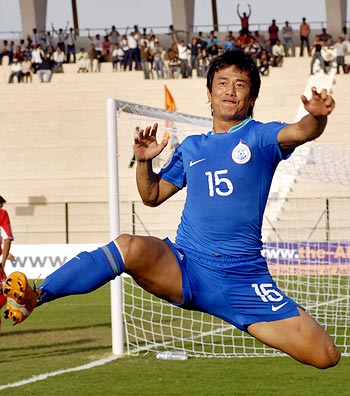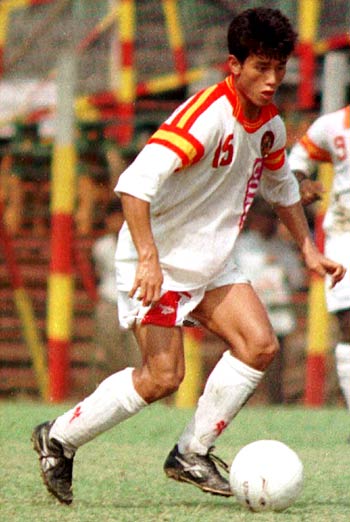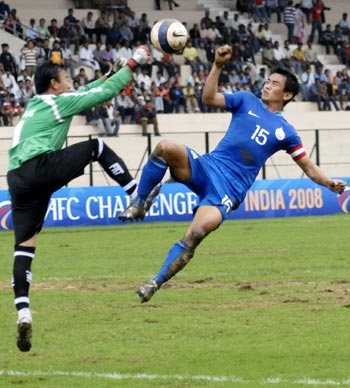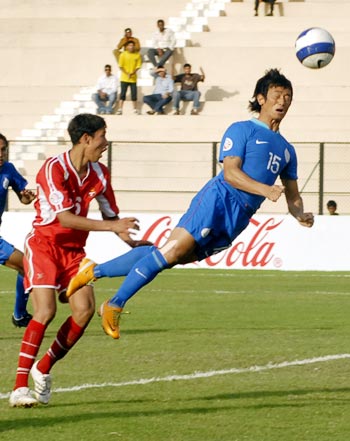 | « Back to article | Print this article |
I feel honoured to play the 100th match: Bhutia
He never thought he would come this far but Baichung Bhutia on Sunday became the first Indian footballer to play in 100 international matches, leading the side against Kyrgyzstan in the crucial round-robin match of the Nehru Cup in New Delhi.
Just before the match started, the All India Football Federation's outgoing General Secretary Alberto Colaco and Delhi Soccer Association President Subhash Chopra presented Bhutia a memento to honour the Indian captain on reaching the milestone.
"I feel honoured to play the 100th match for my country. When I started with my first match in 1995 against Thailand, I did not think that I would come this far. I had thought of playing one game at a time and I have given my best in each of them," Bhutia said after the felicitation.
Bhutia: the face of Indian football
Born at a sleepy but enchanting Sikkim hamlet of Tinkitam, Bhutia has come a long way from playing his first international match as a 19-year-old.
From his debut match against Thailand in the 12th Nehru Cup in 1995, when he came in as a substitute, to playing his 100th in the latest edition of the same tournament, it has been a long 14-year-long roller-coaster journey in which Bhutia has served the country with distinction.
But ironically, and with not many years left in his illustrious career, the face of Indian football of this decade is embroiled in a murky controversy with Mohun Bagan. The 32-year-old Sikkimese, who had quit the game for a few months in 2006 after falling out with then coach Syed Nayeemuddin only to change his mind later, is technically now serving a six-month ban without pay by Mohun Bagan for missing team training and an exhibition match.
Bhutia has led India to six titles
Bhutia has always started in the Indian first eleven in all his 100 matches except in his debut under then India coach Rustam Akramov.
In his career as India captain since 2002, he has led the country to six international titles -- the LG Cup in Vietnam in 2002, the Nehru Cup in 2007, the AFC Challenge Cup in 2008 and three SAFF Cups.
His stellar performance in the 1992 Subroto Cup as a cadet of SAI Centre Gangtok brought him into the limelight and from then he has never looked back. He joined Kolkata giants East Bengal in 1993 when he was 16.
After playing for two years with East Bengal, Bhutia moved to JCT in 1995 and helped the Punjab side win the first National Football League, the earlier version of the current I-League, where he emerged as the leading goal-scorer. And Bhutia's performance didn't go unnoticed and in the same year, he made his international debut in the Nehru Cup in Kolkata.
Bhutia is the first Indian to play in England
Bhutia left JCT in 1997 for East Bengal where he remained for two years before becoming the first Indian to play in an English professional league. He donned Bury FC colours in the English second division from 1999 to 2002 before returning to India to join Mohun Bagan for a season.
Bhutia shifted to East Bengal in 2003 to play for that club for three years, during which he was loaned for around three months (August to October) to Malaysian side Perak FC.
He returned to Mohun Bagan in 2006 and has remained in that club before the suspension issue broke out in May this year.
Involving himself for social causes, Bhutia also played a charity 'Goal 4 Africa' match at the Allianz Arena in Munich in July last year to raise funds for the African children to coincide with the 91st birthday of Apertheid hero Nelson Mandela.
He scored twice in that match which saw players like Michael Ballack, Clarence Seedorf and Mark van Bommel.
Bhutia's achievements second to none
One of the high points of his career came when East Bengal became the first Indian club to win an international title, the ASEAN Cup, in 2003.
Another high point came in the AFC Challenge Cup last year, besides being voted the most valuable player of the tournament. The victory booked India a berth for the 2011 AFC Asian Cup in Doha, a feat last achieved way back in 1984.
Bhutia even scored in the final match of that tournament in Jakarta, in East Bengal's 3-1 victory over favourites BEC Tero Sasana of Thailand. With nine goals to his credit, he was voted player of the tournament.
His other achievements include being voted 1996 Indian Player of the Year, top scorer and best player of the first National Football League 1996/97, top scorer and best player of the SAFF Cup 1999 and Asian Player of the month for May 1999 and October 2002.
For his contribution to Indian football, he was awarded Arjuna Award in 1999 and Padma Shree last year. The government of his home state, Sikkim, has named a stadium after him.

© Copyright 2025 Reuters Limited. All rights reserved. Republication or redistribution of Reuters content, including by framing or similar means, is expressly prohibited without the prior written consent of Reuters. Reuters shall not be liable for any errors or delays in the content, or for any actions taken in reliance thereon.




